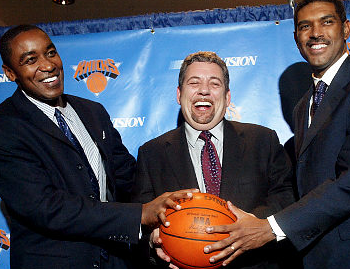The Strange, True Story of Gothamist and Jimmy Dolan

Gothamist, a metro website company, founded in 2003, now has 13 city-specific websites, which reach 2.7 million unique readers a month, according to Quantcast. For a long time, in my opinion, Gothamist was stubborn about growing as a business. Its publisher, Jake Dobkin, did much of the business himself, and didn’t think the math worked out to have full-time ad salespeople. More recently, that math has apparently changed, and now the goal is to have as many ad salespeople as can support themselves. 16 million pageviews a month is, in the web business, a totally decent amount of inventory to sell. And for a larger media company that would like to seize that reader base, it’s a pretty good buy: definitely big enough, but not so big as to be outrageously expensive. And so, seven or eight months ago now, IFC came calling on Gothamist.
IFC has been eager to grow. They had hired a consultant, former MSNBC.com executive producer Rex Sorgatz, to spice up their web business, and for a while seemed on the edge of performing a pretty large-scale online expansion. But that didn’t seem to materialize.
IFC is owned by Rainbow Media. Rainbow Media is owned in turn by Cablevision, a publicly-traded company which is, unsurprisingly, a cable provider. They also own the Clearview Cinema, which you may know from outings to Chelsea! In 2008, they bought Newsday, and they recently spun off the company that owns Madison Square Garden. They’re controlled by the Dolans, who are pretty famously fun-and a bit tempestuous.
So the approach to Gothamist was an audience play. Rainbow and IFC had had some interest in the Village Voice previously, but didn’t see the math working out. But they were still interested in getting a largely online, sort of “indie” audience.
In the discussions with Gothamist, it took a good while for IFC to finally cough up a number. The first number they came up with was $4 million. Now that’s pretty low. You would imagine that Gothamist would figure out they’d make that themselves in the next three to four years or so, so why would they bother selling it for that price?
By March, as Paid Content noted, the offer had edged up to $5 to $6 million.
This was a strange thing to even be reported. “Spoke to a company source,” noted Paid Content. What benefit would Rainbow have in talking to the press about this potential deal? Did they think it would push down the price?
In any event, were a sale to occur, IFC/Rainbow wanted to make payments over three to four years. This is not something that a purchasee would think was a great idea. In the event of any friction, Gothamist would have to sue for the money, which is, obviously, a tricky thing to finance when you haven’t gotten paid for your sale yet.
There were meetings with lawyers and the like but these conversations never got that far-surely in part because it’s hard to negotiate a potential sale when the buying party is leaking deal terms.
Gothamist and IFC did, however, sign a confidentiality agreement. And then, more recently, they also signed a short-term exclusive to negotiate, for a period of 45 days.
Now, Jake Dobkin said something mouthy, as he does pretty regularly. He made a doofy joke on his Twitter about how a Times profile of his friend Lockhart Steele, the owner of the Curbed blog network, was a “blow job.” But Dobkin hadn’t checked his own current slate of advertisers, and this was during a period when the Times was advertising again on Gothamist.
The Voice and Gawker went to town on these two bits of news. The Voice claimed “Gothamist Sells Out to Cablevision,” for starters, which wasn’t true (though to be fair, they were working off Paid Content, who said Gothamist was “being acquired”). And then the Voice asked, among other things: “Wonder how Dobkin’s gonna feel with Jimmy Dolan’s cock in his mouth?” The suggestion being that Dobkin would, in such a sale, lose his freedom to say doofy things about advertisers.
That day, the head of IFC called Gothamist, and said that they had to put a full stop on the negotiations: Jimmy Dolan was flipping out.
This was kind of funny, because IFC and Rainbow had always maintained that Dolan wasn’t involved, and didn’t know about the deal even: they had independence and could pursue business how they wanted.
And what’s more: no one would have written about it in the first place if someone hadn’t been leaking deal terms.
Four weeks passed. The time period in the Letter of Intent to negotiate expired, and, in the end, IFC said that there was no way Cablevision would let a deal go through. Gothamist must have been relieved-at least they’d seen close-up what they might have gotten in bed with.
So for Gothamist, at least, the dust has settled. They walked away from an odd little negotiation that wasn’t actually that interesting, financially speaking, without even much of a lawyer’s bill. The Village Voice wasn’t so lucky. Cablevision pulled something like a million dollars in advertising over either the original comment or the paper’s proud stance of refusing to apologize.
Or were they? Maybe the Voice got equal payment in notoriety and attention, or perhaps even in cash from advertisers impressed with their moxie, and the math works out for them just fine.
But who knows exactly what consequences there’ll be at IFC and Rainbow? Yesterday’s Times profiled Dolan, and it prominently mentioned the Village Voice crack about Dolan’s genitalia. If the original joke so infuriated Dolan that he wouldn’t let IFC pursue a deal that seemed pretty great for them, well, everyone over there must be having a rough week.
